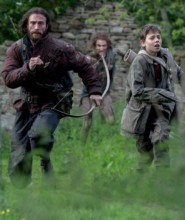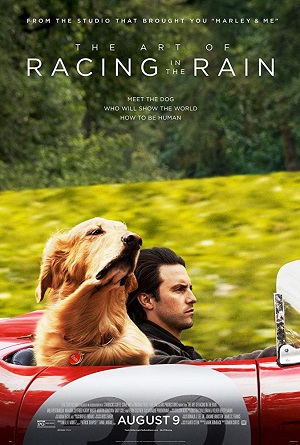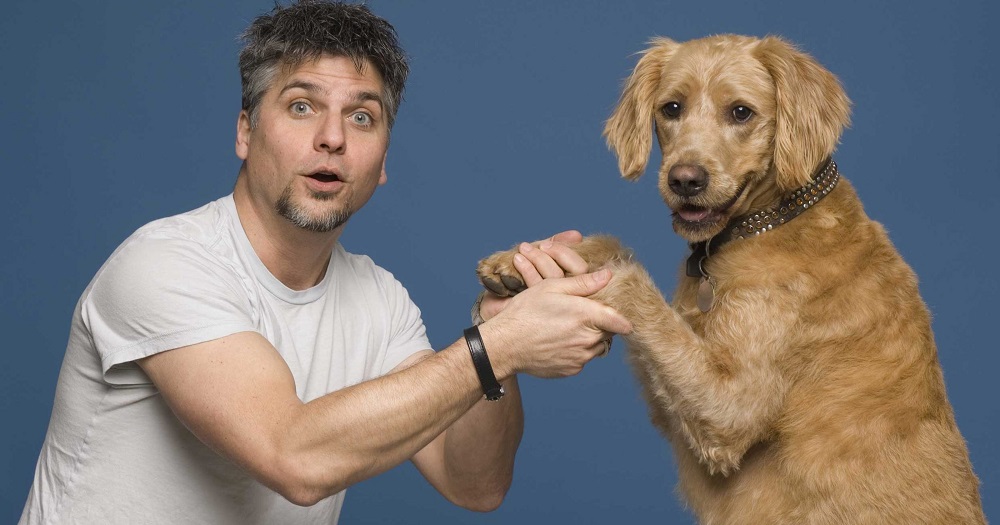
“The Art of Racing in the Rain” – Interview with Garth Stein
by Sara Michelle Fetters - August 18th, 2019 - Interviews
Being Open to Transformation
Author Garth Stein on the line between “art,” “craft” and writing The Art of Racing in the Rain
Best-selling Seattle author Garth Stein isn’t known for taking things easy. The Columbia University graduate (where he obtained both a B.A. and a Master of Fine Arts degree) is an amateur racing enthusiast, documentary filmmaker (co-producing the Academy Award-winning short The Lunch Date in 1989), taught creative writing at the Tacoma School for the Arts and esteemed playwright. He is also the author of the international smash The Art of Racing in the Rain, a Pacific Northwest-set tale of a dog, Enzo, and his roughly 15 years living with racecar driver Denny Swift. Seen entirely from the canine’s point-of-view, the story is an empowering, life-affirming family saga of love, loss, forgiveness, tragedy and joy, the entire spectrum of the human condition explored throughout the pages of the novel.

Featuring Kevin Costner as the voice of Enzo, Milo Ventimiglia as Denny Swift, Amanda Seyfried as his wife Eve and newcomer Ryan Kiera Armstrong as their daughter Zoe, director Simon Curtis (My Week with Marilyn) and screenwriter Mark Bomback (War for the Planet of the Apes) have adapted Stein’s book for the screen. I sat down with the author to talk about the evolution of the project, his thoughts on the adaptation, the love we have for our pets and whatever else crossed both of our minds during our wide-ranging conversation. Here are some edited excerpts from our much too-brief chat:
Sara Michelle Fetters: I imagine last night was pretty fun. I mean, getting to attend a local premiere of the movie based on your bestseller surrounded by friends and family, doesn’t get a lot better than that, does it?
To be perfectly truthful, [last night] petrified me, I gotta be honest with you, because my mother was there, all my relatives, friends, all the car people who I used to race with and all that, like everybody possibly on the planet who could judge me, was there to judge me. I was a little nervous. [laughs] I wasn’t nervous all last week going to do these events all over the country, and even at the LA premiere I wasn’t nervous because I didn’t really have the investment. But last night I felt invested.
Sara Michelle Fetters: What’s the difference from talking about this the first time when you were doing those initial press tours when you were promoting your book, one that ballooned into this bestseller that everybody couldn’t stop talking about, to now where you’re the author seeing this movie that’s an adaptation of your original prose?
Garth Stein: The difference is I’m ten years older, and theoretically ten years wiser. Although, I think wisdom years don’t correlate with age years necessarily. It’s been a real pleasure to watch the ongoing journey of Enzo the dog and his family and to know that I had a part in that.
I say that knowing that you’re going to be like, “But you wrote the book…” I did write it, but in a way I have a sort of a spiritual take on writing and on any of the arts. I don’t believe artists are creators as much as discoverers, explorers in the creative world, and there’s a certain amount of channeling that’s going on and dealing with soul material from who knows where. About becoming a conduit for sort of a larger story or message that, if you can get it right, will suddenly resonate with millions of people. It’s weird.
Sara Michelle Fetters: Well, now that you’ve brought that up, this is a good time to ask a question I was going to bring up a little bit later in the interview. When I doing a little research on you, and I don’t know if it was in an interview or if it was during a lecture that you were giving, you spoke about the differences between the craft of something and the art of something. I found that fascinating. Would you be open to elaborating a little more about that?
Garth Stein: Very much so. I’d love to. That’s exactly it. “Craft” is stuff we can work on, it’s the stuff we can practice, it’s the stuff we can improve and we can get instruction on because we’re using our conscious mind to do an activity that is designed to be done with our conscious mind. But that can only get you so far. It’s releasing the subconscious that taps into this greater world around us, this universe that’s beyond this membrane that we have of reality.
Then things drop in and magic begins to happen. That’s “art.” You can plan all you want, but when something magic happens, you go with the magic all the time, every time. When you can do it a few times in the course of writing a book, it’s good. When you can do it many times in the course of writing a book, it’s like, wow, I’m onto something. When I wrote The Art of Racing in the Rain and I sat down and did kind of this weird thing, I found the magic, and it’s something that all you can do is kind of tip your hat and say, that was really cool.
I hope I have the privilege of doing that again.
Sara Michelle Fetters: But as the artist, as the person that is the creator who had that magic happen, how hard it is for you to maybe step back and let other artists like screenwriter Mark Bomback and director Simon Curtis take the lead?
Garth Stein: In a very real way, the way I kind of came to terms with this whole thing was if they [the filmmakers] want to adapt this book, God bless them. I hope they do really well.
But I also felt like, they better do their work. It’s the same thing I would do when I talk to my three sons. You want it, you better make the sacrifices and do the work to get it, because if you screw it up, it’s on you and not on me.
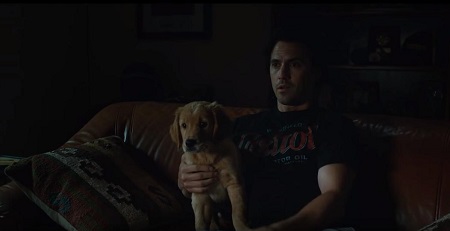
Sara Michelle Fetters: You obviously must feel like that did at least a halfway decent job on the movie. After all, authors don’t have to do PA tours for a movie if they don’t want to.
Garth Stein: [laughs] True! I hadn’t thought of that.
They did a decent job. I’m 100% behind the film.
Look, they had to change stuff. They had to. That’s the nature of the business. There are many layers as to the best way to do things when you’re adapting a book into a motion picture. That’s why I wanted to step back. I was like, look, you’re the studio and you’re putting it out and therefore you have to have certain things a certain way. I get that. You’re a director. You visualize the story in certain ways, and certain things resonate with you. You’re the screenwriter. It’s the same thing.
What any of them did not need was me like tsking in the corner and shaking my finger. You just don’t need that. So if it comes out and it’s horrible, I’m just going to step back and say, “Look at this book. Read the book.” And if it comes out and it’s great, I’m going to say, “Good on ya!” and not take credit for how it all turned out.
And they did it! So good on them. You know what? The heart is in the right place for this movie. Did they change things? Yes, but the heart was always in the right place.
Sara Michelle Fetters: But, you do have a filmmaking background. Were there ever moments where…
Garth Stein: No. There weren’t. [laugh] I have a background in documentary film, which is a different thing. You know you approach things in a different way, and you think about them in a different way. It tends to be more craft than art. There are art moments, but it’s very much cerebral in terms of how you’re trying to structure the argument or the story that you’re telling.
Sara Michelle Fetters: Which is interesting that you say that because this book is very cerebral. It is literally from the point-of-view of a dog.
Garth Stein: Yeah, that’s true. [laughs] The voice of the dog. Yes.
But you know, in the way that this story came out, the framework that I had for it was very generous and very loose. In other words, I didn’t spend a lot of time plotting each individual moment. I could take you through the book and point to the things that were magic.
The whole zebra sequence was not something that was in any of my notes. I didn’t think of it. I didn’t preconceive it. I went into my office one day and I said, all right, where am I today? You know what? Before I do anything today, I’m going to give myself a writing exercise. I’m going to put Enzo through his paces. I’m going to put him in jeopardy and I want to see how he gets out of it. I gave myself permission to throw it away if it wasn’t any good or didn’t serve the story. I said, I’m not going to use it in the book.
That’s a good thing writers should do all the time. It’s okay to make mistakes. So I started writing, and suddenly the whole zebra sequence in the beginning just came out, and I was like, oh crap. That’s actually really good. Not only am I gonna keep it, I’m going to take that zebra motif and use it more because that’s the theme of the entire book. I’m going to have to drop this in at different places. So now how do I take that inspiration and, using my craft skills, make it fit into the story for maximum impact? That’s where we need the craft. That’s the difference between “craft” and “art.”
Sara Michelle Fetters: Obviously with a movie, it’s not going to be all filmed here in Seattle.
Garth Stein: Oh yeah. In an ideal world. But a studio is going to make studio decisions when they’re filming. I love when they go to Mercer Island and it’s like, that’s the freaking ocean! I’m like, Lake Washington is big, it’s not that big. [laughs]
Sara Michelle Fetters: But for you as an author, as far-reaching and as large in scope as the book is, it still feels true to the Pacific Northwest. Was that always important to you, to make sure to infuse that mindset of the Pacific Northwest and Seattle into the story?
Garth Stein: I mean this is where I grew up. I grew up in Shoreline. I went to Shorewood High School. Go T-birds. I always want to have Seattle as a backdrop of any of the things I write. It becomes a character.
Seattle is a weird city. It doesn’t have the same gravitas as many New England towns, that they have their little sign up saying “invented in 1552.” That’s not the way Seattle worked. In 1860 there were no white people here. In 1861 there were white people here cutting down trees. In that sense, we don’t have the same kind of traditions as other places.
And, by the way, all apologies to the native peoples who were here first, who got totally f-ed. Just so we know. Let’s make that really clear right now that they got f-ed.
With that understanding, I think that what Seattle does have is the natural beauty that we have the privilege to use to our advantage, a sort of a sense of reinvention and innovation that people come here looking for in how to shape and retell their personal story. I want to try and use the city as a character in that transformative way in my books.
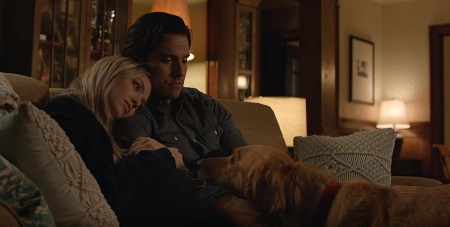
Sara Michelle Fetters: The other thing you do well, especially in this book, is the utilization of animals as family members. Why is it that people tend to treat their animals, in this case Enzo, better than they do themselves?
Garth Stein: It’s all about unconditional love, I’m afraid. We don’t have any expectations for our pets. We’re going to love our dog. Even if our dog craps on the floor, we’re going to love our dog. Even if our dog eats our best shoes, we’re going to love our dog.
If you come home from a long day at work and open up the kitchen door with your arms full of groceries and you find your spouse lying naked and asleep on the kitchen floor, you’re going to be like, “Get up!” But your dog, you’re going to be like, “Aww! That’s so sweet.” We have that sense of unconditional love and, unfortunately, we don’t always have that with the people around us. We put tons of conditions on one another that honestly don’t need to be there. And that’s bad. I think we should treat each other more like we do our dogs. There’d be so much more love in the world if we did.
Sara Michelle Fetters: That’s the great thing about the father-daughter relationship in this book and in this movie. Stuff happens. Bad stuff happens.
Garth Stein: Dramatic things happen. [laughs]
Sara Michelle Fetters: Yes. That’s a good way to put it. Dramatic things happen. No spoilers. [laughs]
But, even with all that drama, that bond between Denny and Zoe survives. Why can’t we as human beings treat ourselves as well as they treat Enzo? Why can’t we persevere and love one another unconditionally no matter what might be happening in our lives the same way Denny and Zoe do?
Garth Stein: Because our ego gets involved. We become lost in own self-interest and our own defensiveness and we are afraid. We’re afraid of losing people. We’re afraid of losing the things that we’ve built around ourselves, all the little bits of our life that we’ve piled up in the bricks that have become the wall that shields us from the outside world. We have to allow ourselves to be more vulnerable and to accept that not everything is going to be the way we want it to be. That we can only control one person. That’s it.
When it all started, you were born and somebody waved a magic wand and breathed life into your little bloody blob. You were given the permission to make choices for that one person and that’s it. If you walk around presuming you can make choices for everybody else around you so that they conform to the view that you want, that’s going to become a problem and we should recognize that. We should be more generous with other people and with ourselves. We should allow ourselves to make mistakes. We’re so deathly afraid of making mistakes. and if you make a mistake, we need to be able to say, “I made a mistake. I would like to apologize for that.” That’s it. That’s all it takes. Just own it.
I was at a soccer game for my kid, a tournament down in San Diego, and there was a dad on the other team who was kind of being a little bit of a…well…you know. He said something to me and got kind of nasty for no reason, at least that’s what I thought. I kind of responded to that because suddenly my ego was enflamed. Suddenly I’m on my thing, right?
We had a little bit of an exchange and he was getting riled. Finally, I just took a second and I was like, there’s no reason for this. I looked at him and was, if I offended you in any way, I just want to apologize. There’s no reason why we should be having this confrontation. I’m not going to antagonize you. I’m not going to get in your face. I just want you to know, if I’ve upset you in any way, I apologize. I own it.
This guy, he didn’t know what to do. His wife came up and took his arm and said, “Thank you,” and then she guided him away. That’s all it took. Suddenly it was over. No one can be mad at you if you just step up and say, “Yeah, my bad,” and take responsibility. But our egos often don’t let us do that. We need to take our egos out of the equation.
Sara Michelle Fetters: Changing directions a little, did you hear a voice similar to Kevin Costner’s when you were writing Enzo? What did you think of that vocal casting?
Garth Stein: No, I did not. [laughs] No and no and NO, is the answer. That’s not the way my brain works. I don’t really hear a specific voice. I don’t really see a specific actor or anything like that. Not at all. Kevin Costner? No.
I mean, Enzo in the book says he would want to be voiced by James Earl Jones. I thought that was going to be easy. It’s a no-brainer, right? I don’t know why they didn’t go with James Earl Jones. But then they said, we have Kevin Costner and I was like, wow. Okay. I went to the internet and looked up Field of Dreams on YouTube and watched a few clips. There’s a lot of voiceover in that. I was like, this is actually a really good choice.
Presence. Costner has a presence and he has a confidence. He has a straightforward tone that I think people trust. That’s what was needed for this movie. Everyone has to trust Enzo. The audience has to know that Enzo’s going to get us through the story okay and in one piece.
Sara Michelle Fetters: What are you working on next? Where do you go from here?
Garth Stein: I’m doing tons of stuff! I’ve got a graphic novel coming out next August. It’s so awesome. I love graphic novels. I mean, working with Matthew Southworth, who’s my collaborator, is just a ton of fun. Fantagraphics is going to be putting it out next August. We’re going to go do ComicCons and all that kind of stuff. I’ve also got a novel about old people called A Couple of Old Birds, and it’s about two 80-something-year-old ladies who become best friends and manage to heal each other and heal themselves while forging on with life at the ripe old age of 87. So, lots of stuff. I’m busy.
Sara Michelle Fetters: For people who are going to be coming to your story through the movie, what do you hope they take away from the experience?
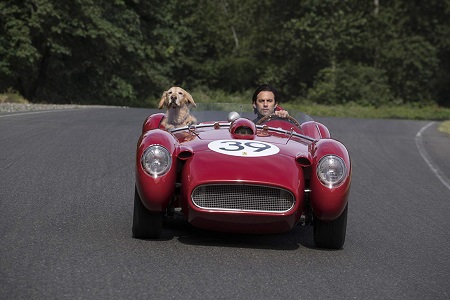
Garth Stein: Yeah. I have no allusions. More people are going to see the movie than read the book,
I don’t have any expectations. I don’t have a one thing that they need to take away. I want them to take something. Just take something. Even if you’ve got to steal it, just take something.
Whenever I write a book, and now with this movie, I want people to go into it and be open to the experience, to see how it goes. To see if there’s something in there that resonates with you. That makes you think about your position in this world and your relationship with other people. Like, we were just talking about unconditional love and things that you can be doing to improve yourself and therefore also improve the lives of the world and the people around you. That’s pretty incredible. Maybe someone can think about that?
It doesn’t have to be a big deal, reading the book or watching the movie, but it can be. I want people to be open to that experience. I want people to be transformed in some way, even if it is just a little, teeny way. Just be transformed and be opened to being transformed.



